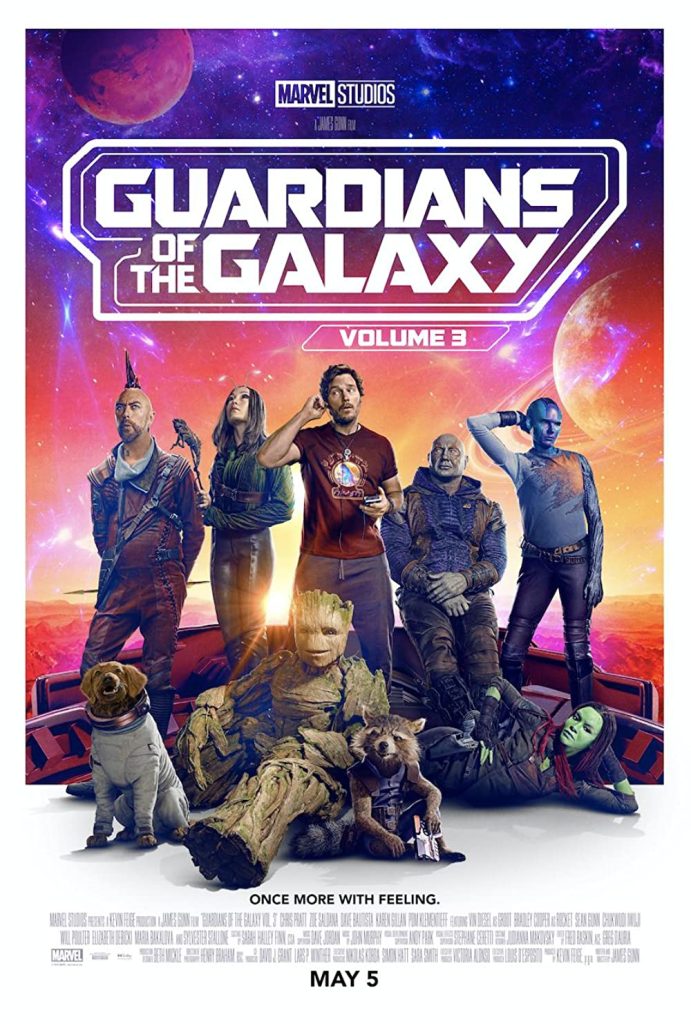Guardians of the Galaxy Vol. 3: Messy Heroes in Need of Mercy
 by Ted Giese
by Ted Giese
A botched kidnapping attempt by the golden-skinned alien Adam Warlock gravely injures the target, Rocket. With Rocket’s condition critical, Peter Quill (“Star-Lord”) and the rest of the Guardians venture into danger to save their friend in a showdown that sees them face off against the villains who transformed Rocket from a baby raccoon into the irascible and resourceful Guardian.
At the heart of the film is Rocket and his tragic background as a laboratory experiment of the High Evolutionary. This diabolical intergalactic mad scientist is revered and feared by some as a god. Among other things, he engineered the arrogant gold-skinned alien species “The Sovereign” introduced at the beginning of the second film. Believing Rocket, the experiment that got away, is the key to his most recent project, the High Evolutionary is bent on dissecting the genetically modified raccoon’s brain to unlock the secret of Rocket’s unpredicted ingenuity. Flashbacks into Rocket’s past reveal a heartbreakingly bleak world of animal test subjects destined for destruction when their usefulness is exhausted. This history explains much of the emotional turmoil and rage displayed by Rocket in earlier instalments.
Rocket’s story isn’t the only source of sadness in this film. The despondent Star-Lord, still grieving the demise of his complicated relationship with Thanos’ daughter Gamora following the events of 2018’s Avengers: Infinity War and 2019’s Avengers: Endgame, has turned to binge drinking. And as the crew settle into their new digs on Knowhere, they become increasingly aggravated and prone to bickering. The empathic Mantis and the hypercritical and pragmatic Nebula struggle to keep the expanding team together. They, along with Quill, Rocket, Groot, and Drax the Destroyer, have welcomed to the team Kraglin and the telepathic-telekinetic Labrador Cosmo the Space-dog. With everyone feeling lost, the mission to save Rocket becomes just the thing they need to remind them of their love and loyalty for each other.
Guardians of the Galaxy Vol. 3 is writer-director James Gunn’s last installment with these characters before he leaves Marvel to lead the new DC film universe. It’s obvious as a result that Gunn wanted to finish the story he was telling with these characters, especially with Rocket. The result is a film that feels overstuffed and longer than needed—a symptom of the permissive indulgence by studio heads and producers unwilling to rein in directors which has given us recent duds like 2022’s Thor: Love and Thunder. While better than that, this is no Spider-Man: No Way Home.
With Vol. 3, Gunn oscillates between melancholy and violence, peppered with a liberal use of profanities and a surprising amount of gore. Regardless of the film’s rating, this not a movie appropriate for younger viewers. Even setting aside the language and violence (replete with dismemberments and decapitations), the focus on frightening and intense scenes means the film easily earns its hard PG-13 rating. In a scene reminiscent of the melting face of the villainous Major Arnold Ernst Toht at the climax of Indiana Jones and the Raiders of the Lost Ark, the nightmare fuel removal of the High Evolutionary mask is a moment of horror beyond anything that should ever be included in a G rated film. Parents of young children who enjoyed the original film will want to keep this in mind.
The Hands That Make Us
The Guardians of the Galaxy franchise hasn’t shied away from religious ideas in the past. In Vol. 1, Drax expressed his desire to see his murdered wife and children again in a future resurrection of the dead. Here in Vol. 3, we see depicted a glowing white entryway into the afterlife, while the statement is made that that “there are the hands that make us. And there are the hands that guide the hands.” The reference to the “the hands that make us” refers to the High Evolutionary and his laboratory experiments. But who are the “hands that guide the hands”? On the surface, this may sound great, as if Gunn is moving into the “unknown god” appeal that St. Paul made to the Athenians—the One in whom “we live and move and have our being” (Acts 17). But it’s more likely a kind of Gnosticism, with the High Evolutionary functioning as a kind of materialistic and arrogant demiurge, while the “hands that move the hands” refers to some spiritual monad or supreme being existing above everything. The High Evolutionary himself, at any event, is a sort of atheist. Near the end of the film, when God is invoked as reason to be merciful, his immediate response is: “There is no God! That’s why I stepped in!” In this moment, the villain is revealed in his arrogance to be unaware of the “hands that guide the hands.”
The High Evolutionary doesn’t care if he hurts or even kills his test subjects while attempting to achieve what he considers advancement and perfection. His frustration with the imperfections of the universe drives him to control and perfect everything he touches. In one instance, he has created an entire world populated with animal hybrids; but when it is not the perfection he desires, he destroys it. In this film, evolution is cast as an evil and cruel tool in the hands of a villain—and a transhumanist villain at that, using technology to carry out his evolutionary goals.
When he is in the end defeated and unmasked, the disfigured and grotesque High Evolutionary laments that “All I wanted to do… was to make things… perfect!” But Rocket responds: “You didn’t want to make things perfect, you just hated things the way they are.” This reads as a deep dissatisfaction with the goals of both transhumanism and progressive ideology, which are constantly attempting to force the evolution of society, culture, and humanity into something “perfect.” There is a sort of false redemption here that, when unmasked is shown to be driven not by love but by hate—hatred for what came before and for what currently exists. Is this Gunn’s own view? And if so, does he see the desire to become “perfect” as utterly hopeless? Would he rather wallow in brokenness?
Longing for Perfection
Christians can commiserate with the frustration over the lack of perfection in the world as well as imperfect (and ultimately dangerous) attempts to achieve it by force. But our response ultimately differs. Jesus indeed teaches us, “You therefore must be perfect, as your heavenly Father is perfect” (Matthew 5:48). For Christians, the honest embracing of our failures to achieve perfection—the repentant desire to seek forgiveness and peace in this life while striving for perfection—is tempered by the promise that the love of God in Christ Jesus is the ultimate source of redemption and future perfection. If on the one hand the High Evolutionary is arrogantly unaware of his own shortcomings and only interested in the kind of redemption he can achieve by his own works, on the other hand the Guardians of the Galaxy are very aware of their imperfections and their need for external grace and mercy just to get through the day.
Here in Vol. 3, as in the other Guardians of the Galaxy films, St. Peter’s advice to “keep loving one another earnestly, since love covers a multitude of sins” (1 Peter 4:8) is on full display. Near the end of the film, in a touching and poignant moment between Drax, Nebula, and Mantis, Nebula calls out Drax for his dangerous lack of self awareness. While Mantis agrees that Drax is indeed stupid, she defends him, saying that Drax is caring in a way the rest of them are not. Drax is deeply hurt and troubled by this encounter, so Mantis, out of love for him, uses her abilities to make him forget the whole conversation: “love covers a multitude of sins.”
But the conversation was necessary for Nebula in order for her to begin to see Drax in a new light. By the end of the film, Drax proves his caring heart for others, particularly for the child test subjects of the High Evolutionary. Nebula says to Drax: “You were never meant to be a destroyer. You were meant to be a dad.” Here Gunn completes Drax’s character arc, moving him from the bitterness and anger of Vol. 1 over the loss of his wife and daughter to the joyful father to dozens of orphans. This makes Guardians of the Galaxy Vol. 3 yet another in a string of recent films where the idea of fatherhood is not maligned but encouraged. Gunn, who is by no means a model of personal perfection, doesn’t give the audience a perfect traditional family with his films, but he offers hope for the lost and the broken “losers” of the world—people who have lost things like homes, families, and normal lives. He offers hope that some comfort can be found in the love, friendship, and loyalty of others. By the end of the film, each of the Guardians needs mercy. And they each receive some relief from their sorrows and an opportunity to continue to grow in a positive direction. Even the secondary antagonist of the film, Adam Warlock before, he does anything to deserve it also receives a second chance from Groot and the Guardians of the Galaxy.
For viewers deeply invested in these characters, and for those who have grown up alongside them over the last nine years, Guardians of the Galaxy Vol. 3 has the potential to be an emotional film—especially knowing that this is likely the last time these characters will all be together in a film. As a result, they will be inclined to forgive the film’s shortcomings. For casual audiences, or for those dragged along to the theatre with fans, the film’s messiness and long runtime may be too much for them to fully enjoy it. The violence, profanity, and gore will also distress many. Yet buried in the muck and grime is a heart of mercy and grace worth considering. Christians who watch this film know that “the hands that guide the hands” ultimately do not belong to some Gnostic idea of a spiritual supreme being but are instead those of the one true God who is “gracious and merciful, slow to anger and abounding in steadfast love” (Psalm 145:8).
———————
 Rev. Ted Giese is lead pastor of Mount Olive Lutheran Church, Regina, Saskatchewan, Canada; a contributor to The Canadian Lutheran, Reporter; and movie reviewer for the “Issues, Etc.” radio program. For more of his television and movie reviews, check out the Lutheran Movie Review Index.
Rev. Ted Giese is lead pastor of Mount Olive Lutheran Church, Regina, Saskatchewan, Canada; a contributor to The Canadian Lutheran, Reporter; and movie reviewer for the “Issues, Etc.” radio program. For more of his television and movie reviews, check out the Lutheran Movie Review Index.



